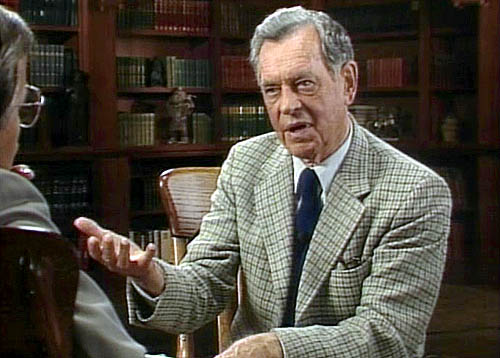A new awakening of spirituality would radically boost the spirituality quotient of us Americans, leading to a reduction in bad sexual behavior and in unwonted aggression such as bullying.
What that new awakening would precisely be like, though, I scarcely know. This is in part, for me, an ongoing investigation. Often, it is the negatives of the quest that tend to worry me.
One negative would of course be that of whose spirituality, whose religion, would be elevated. I'd like to see a spirituality that would transcend and unite the various separate religions. It's possible to bridge the gaps between religions, I firmly believe. All one has to do is read the works of Joseph Campbell, for instance, and take what he has to say to heart.
 |
| Joseph Campbell talking to Bill Moyers |
A good place to start is The Power of Myth, a book-length series of television interviews that PBS's Bill Moyers conducted not long before Campbell's death in 1987. Campbell spent a lifetime studying and comparing humankind's various systems of mythology, both past and present, and finding numerous common threads among our various religious beliefs.
Campbell held that our monotheistic religions (Judaism, Christianity, and Islam) are in fact myth-based — which is not to say the religions are untrue and therefore disposable. Yet he said that these religions that were once so dominant in the West have lost sight of their connections to the ancient mythologies and their concomitant modes of spirituality.
Campbell taught that mythology has a fourfold function in human society:
- The metaphysical function: awakening a sense of awe before the mystery of being.
- The cosmological function: explaining the shape of the universe.
- The sociological function: validating and supporting the existing social order.
- The pedagogical function: guiding the individual through the stages of life.
I'd say that we've pretty much lost sight of all four. The shape of the universe is now the province of science. The scientific discovery of the big bang as the origin of the universe commands our attention, no doubt, but for most of us it does not command our awe.
Awe and wonder may still strike us from time to time, such as when we go outdoors and look at a clear night sky ... provided we can get away from the bright lights and smog of cities and suburbs. But we've tossed away any sort of narrative that would validate and confirm that sense of wonder.
Meanwhile, we look to secular notions to support our social order. For us Westerners, those notions have their roots in the eighteenth-century Enlightenment in Europe. According to Wikipedia, the Enlightenment's purpose was "to reform society using reason, challenge ideas grounded in tradition and faith, and advance knowledge through the scientific method. It promoted scientific thought, skepticism and intellectual interchange and opposed superstition, intolerance and ... abuses of power by the church and the state."
That word "enlightenment" is likewise used in the East, in Buddhism, to mean the ultimate spiritual destination of human beings. Yet in the European Enlightenment, also called the Age of Reason, spiritual notions were rudely cast aside.
I believe that today we need to recover a broad-based spirituality that can reunite us and bestow on us as a society once again the four primary functions of a mythological understanding of who we are and what we're doing here. More on that in later posts in this series ...

No comments:
Post a Comment